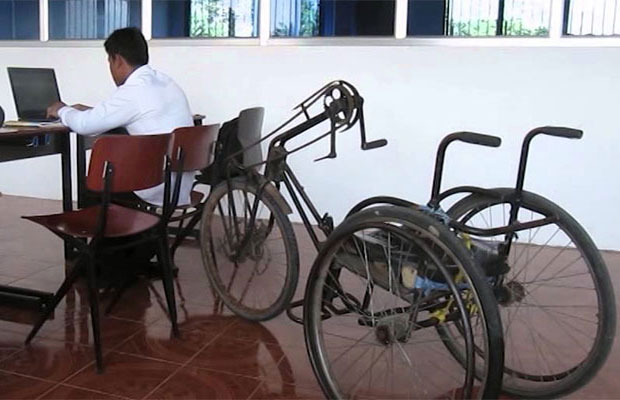
A Transformative Experience at Don Bosco Kep
In Cambodia, where an estimated 700,000 people are living with a disability — full inclusion in the educational system, in job training programs and in employment itself — often remains elusive. Invisible to society, physically challenged youth therefore face an additional task: how to improve their prospects for a brighter, more secure future? For Salesian missionaries at Don Bosco Kep, the answer is clear.
“Accessibility is the key,” says Jaime Correa, international programs manager at Salesian Missions, who has been instrumental in procuring funding to transform the technical school’s campus. Soon, he says, it will be welcoming to all students — regardless of physical ability — and will grant access to education and training opportunities that open the doors to a brighter future.
Since its inception in 2011, Don Bosco Kep has provided opportunities for technical training and personal development for disabled and at-risk youth, which improves employability and secures an economic future free from the crushing cycle of poverty. In addition to learning English, students pursue market-driven coursework in areas such as communications, computers, office administration, hospitality, tailoring and the arts.
These opportunities are critical in a society largely unprepared to accommodate students with disabilities. In fact, a 2013 report by the Cambodian Disabled People’s Organization highlights the failure of mainstream public schools to adequately support such students. A technical education provides disabled students a wealth of new employment options previously unavailable to them. It helps liberate them from discrimination, abuse and social isolation; and enhance their self-esteem and worthiness.
“We know that youth with disabilities are just as interested in being productive members of society as their better-abled peers,” says Jaime Correa. “Our primary goal is to create an environment where the physically and visually impaired can access classrooms, dorms and other facilities — in ways that enable them to be self-sufficient, and that support their educational goals.”
This vision has been years in the making. In 2013, Don Bosco Kep first opened its doors wide to physically disabled students like Ang — yet challenges remained. Students dependent upon wheelchairs were unable to navigate stairs and narrow entryways, or gain access to bathrooms, without assistance from others. “I felt like a burden,” recalls Ang.
But changes are coming thanks to the work of Salesian Missions, which led to grants from the U.S. Agency of International Development’s (USAID) American Schools and Hospitals Abroad Program Worldwide (ASHA). Ang — and other students like him — will soon find it much easier to move about campus under his own power. Planning is underway to eliminate barriers and transform the campus into one that provides increased opportunities for education for one of Cambodia’s most vulnerable groups.
One elevator will be installed in multi-story buildings that house student dormitories, administrative offices and the arts department and classrooms. Five wheelchair ramps will provide access to the cafeteria, dormitories and main entrance of the school. And three bathrooms — one each in the male and female dormitories, as well as the cafeteria — will be renovated to accommodate handicap accessibility.
“The first step for students with disabilities to reach their full potential, is to reach the classroom,” says Father Mark Hyde, director of Salesian Missions. “This project will empower students with disabilities by providing increased access to education, and the opportunity to learn skills in high-demand technical areas, in a personally enriching environment.”
As a result of this project, Don Bosco Kep also hopes to play a leading role in abolishing the taboo of disability in Cambodian society. “We have engaged these students more fully in campus life, and encouraged positive attitudes toward this vulnerable group. This will decrease the stigma of disability on campus and encourage an environment of inclusion that celebrates diversity,” says Father Albeiro Rodas, SBD, Rector of the school.
Our mission gives hope to millions of youth around the world, and teaches tolerance and acceptance of all peoples. What’s your mission?

